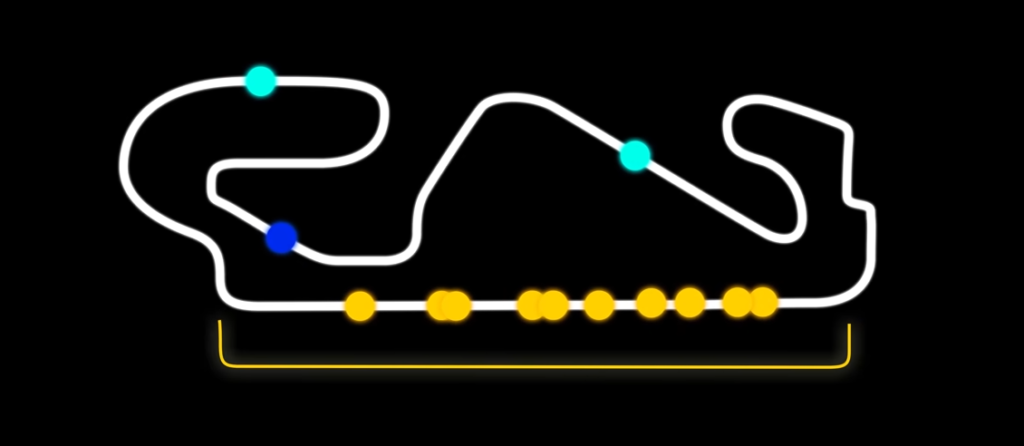
HUMAN RACING IS FACING ITS BIGGEST CHALLENGE YET
In 2022, Formula 1’s Lucas Blakeley, an F1 Esports sim racer, defeated 4-time World Champion Sebastian Vettel in a real-world Race of Champions (ROC) event.
This was not a fluke.
Sim racing, once seen as a “game,” is now producing drivers faster, sharper, and more adaptable than traditional racing academies. But this is just the beginning.
By 2035, will AI-trained racers surpass human drivers altogether?
By 2040, will AI itself become the dominant force in motorsport?
This article isn’t just about whether sim racing improves real-world driving—we’re taking it much further.
WHERE SIM RACING ALREADY SURPASSES TRADITIONAL TRAINING
1. Enhanced Reaction Time & Decision-Making
✅ Sim racers react 11–30% faster than non-gamers in split-second decision scenarios.
Psychological Science Study on Gamer Reflexes
2. Cognitive Load Optimization & Racecraft
✅ AI-enhanced telemetry data from iRacing & Gran Turismo outperforms human coaching.
Stanford University: The Cognitive Impact of Sim Racing
3. Muscle Memory, Steering Precision & Spatial Awareness
✅ Direct-drive force feedback wheels and VR setups provide identical steering feedback to real cars.
Motorsport Prospects: How Sim Racing Bridges to Real Tracks
THE RADICAL FUTURE OF RACING (2035-2050)
1️⃣ NEURALINK + AI = THE SIMULATED SUPERHUMAN DRIVER (2028–2035)
By 2035, the best racing driver on Earth may not even be human.
Neuralink-Enhanced Drivers → Brain-computer interfaces will enable:
- Reflex times beyond human capability
- AI-assisted muscle memory hardwiring
- Predictive braking based on biofeedback
Neuralink & The Rise of Neuro-Training
2️⃣ AI-GENERATED RACE STRATEGY: THE END OF HUMAN PIT WALL DECISIONS (2030–2040)
Quantum AI in Racing → Real-time race simulations will:
- Predict millions of possible outcomes per lap
- Adjust driver strategy on the fly
- Replace human strategists in pit walls
Quantum Computing in AI Decision-Making
4️⃣ AI-ONLY RACING LEAGUES: WILL HUMANS STILL BE ALLOWED TO COMPETE? (2040–2050)
Formula X: The First AI Racing League?
AI-generated drivers will outpace human limits—so will F1 allow them?
2027–2032:
- The first AI-driven race team enters Formula 1
- AI optimizes every aspect of racing lines, braking, fuel efficiency
- Human drivers struggle to keep up
2035–2040:
- AI-only leagues like “Formula X” emerge
- AI vs. Human Championships become the new motorsport spectacle
- Human intuition vs. AI-perfect decision-making
Sony’s GT Sophy AI Outracing Humans
THE DEBATE: F1 LEGENDS VS. AI-TRAINED DRIVERS
Max Verstappen: “Sim racing doesn’t teach real fear, real risk.”
Lewis Hamilton: “AI shouldn’t drive in Formula 1—it’s about human spirit.”
❌ COUNTERARGUMENT: WHY HUMAN DRIVERS MAY BECOME OBSOLETE
✅ AI doesn’t feel stress. It never makes an emotional mistake.
✅ Biometric-controlled AI will outperform even the best human instincts.
✅ Formula 1 may become a sport where AI-human hybrids compete against pure AI machines.
THE ECONOMIC IMPACT: WILL SIM RACING FINANCIALLY OUTPACE F1?
$10M+ is spent per season on real-world testing for F1 teams.
Sim-based AI training is 99% cheaper.
Lower carbon footprint, infinite scalability—sim training is the future.
Financial Prediction:
✅ By 2035, AI-optimized racing leagues will surpass F1 viewership
✅ By 2040, an AI-trained F1 driver will win a championship
THE TIMELINE: RACING’S FUTURE BY 2050
| Year | Milestone |
|---|---|
| 2025 | AI-assisted training becomes standard in racing academies |
| 2027 | First fully sim-trained driver enters Formula 1 |
| 2030 | Quantum AI pit strategy replaces human decision-making |
| 2035 | First “Formula X” AI-only racing league emerges |
| 2040 | AI driver wins first F1 race |
| 2050 | Human drivers no longer compete in top-tier motorsport |
FINAL TAKEAWAY: SIM RACING ISN’T TRAINING—IT’S THE FUTURE OF MOTORSPORT
The big question: Will humans still belong in racing, or will AI take over?
Drop your thoughts in the comments! Should AI be allowed to compete in F1?
WATCH LIVE: Lando Norris iRacing vs. Real F1 Onboard Comparison
